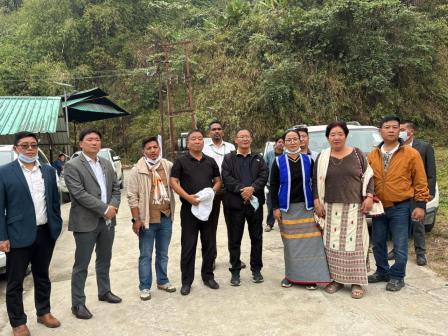-
COPU reviews state PSUs in second sitting
-
CM stresses on strong internal security, tech-driven policing
-
Cabinet approves proposals aimed at strengthening governance, enhancing public…
-
Body found hanging at bus stop with limbs tied sparks…
-
Mein chairs pre-budget consultative meeting with community based organisations
-
District level training on Census of India 2027 begins at…
-
WCD Minister reiterates commitment to safeguarding rights, dignity of…
-
Woman loses life in massive fire, two children seriously injured
-
 UA Minister inspects burial ground, focuses on maintenance and improvement
UA Minister inspects burial ground, focuses on maintenance and improvement
-
 UA Minister inspects burial ground, focuses on maintenance and improvement
UA Minister inspects burial ground, focuses on maintenance and improvement

India and China have agreed to speedy disengagement on the Dokalam plateau in Bhutan, ending a military face-off lasting almost three months
NEW DELHI, Aug 28: India and China have agreed to speedy disengagement on the Dokalam plateau in Bhutan, ending a military face-off lasting almost three months.
The disengagement of the militaries of the two countries comes days before Prime Minister Narendra Modi is scheduled to visit China for the Brazil-Russia-India-China-
“In recent weeks, India and China have maintained diplomatic communication in respect of the incident at Dokalam. During these communications, we were able to express our views and convey our concerns and interests,” a statement from the Indian foreign ministry on Monday said.
“On this basis, expeditious disengagement of border personnel at the face-off site at Dokalam has been agreed to and is ongoing,” the statement said.
There were no details of what compromise was reached and how it was reached to end the military face-off that began on 16 June.
According to a PTI report from Beijing, China had in a statement said Indian troops had pulled back but was ambiguous about the status of its own troops. Chinese foreign ministry spokesperson Hua Chunying told reporters in Beijing, “Chinese troops on the ground have verified it. China continues to exercise sovereignty. China will make adjustments according to the situation.”
“The Chinese side continues to uphold sovereignty and territorial integrity according to the historical convention,” PTI quoted Hua as saying.
But analysts like former foreign secretary Kanwal Sibal said the wording of the Indian statement indicated that the withdrawal could not have been unilateral and that it was clearly disengagement by both sides.
“Why (should the Chinese) talk of making adjustments if the pull-out was unilateral? This means the Chinese side has also pulled out,” Sibal said. He attributed the comment by the Chinese giving the impression that India had pulled back unilaterally to semantics that would give Beijing a face-saver after issuing ultimatums to India to pull back unilaterally.
Tensions between the Asian giants have been high since 16 June after Bhutan objected to an attempt by Chinese troops to build a road on the Dokalam plateau. Indian troops stationed in Bhutan under a special security arrangement intervened to keep Chinese troops at bay. India said the action to construct the road was unilateral and changed the status quo. India was concerned the road will allow China to cut off access to northeastern states.
At an event to mark the 90th anniversary of the People’s Liberation Army last month, Chinese President Xi Jinping said the People’s Liberation Army had the confidence to defeat “all invading armies and safeguard national sovereignty, security and development interests.”
China had demanded that India unilaterally withdraw its troops before there could be any dialogue on the matter. Spokesmen for the PLA had accused India of “invading” and “trespassing” into Chinese territory.
Chinese state-run media like Global Times and People’s Daily had adopted an aggressive tone, reminding India of the 1962 war that had ended badly for India.
India, on its part, sought a pullback by troops from both countries.
New Delhi also said that diplomats from India and China were engaged in trying to resolve the crisis.
Srikanth Kondapalli, a professor of Chinese Studies at the New Delhi-based Jawaharlal Nehru University, said implicit in the Indian foreign ministry statement was an understanding that China would not continue with the road construction in Dokalam which India had cited as detrimental for its national security.
“India being non-committal about Prime Minister Modi attending the Brics summit could have been one of the factors” leading to the resolution of the standoff, Kondapalli said.

Kenter Joya Riba
(Managing Editor)She is a graduate in Science with post graduation in Sociology from University of Pune. She has been in the media industry for nearly a decade. Before turning to print business, she has been associated with radio and television.
Email: kenterjoyaz@easternsentinel.in / editoreasternsentinel@gmail.com
Phone: 0360-2212313

